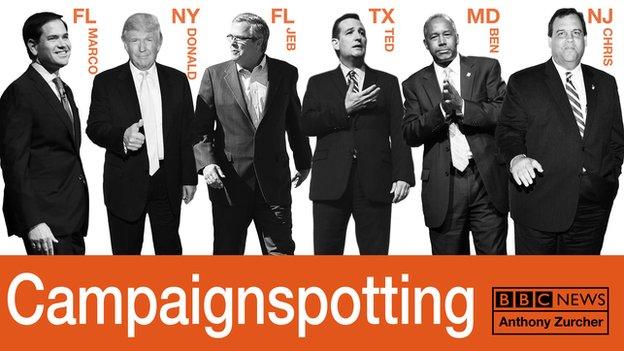Donald Trump's Southern hospitality
- Published

When Donald Trump takes the stage at the Republican debate in Charleston, South Carolina, on Thursday night, he'll have an unlikely home field advantage.
The New York real estate mogul has posted a consistently commanding lead, external in presidential preference polls in the state, which holds its primary election just two weeks after Iowa and New Hampshire. He's made more than a dozen trips there, drawing crowds in the thousands, while the gatherings of his competitors pull in hundreds at best.
In fact, across the South - in states like Mississippi, Florida, Texas, Georgia and North Carolina - Mr Trump has been immensely popular. Last August, the candidate gave a speech at a football stadium in Mobile, Alabama, that drew an estimated crowd, external of 30,000 - orders of magnitude above what any other Republican has tallied.

It all makes for a rather unusual attraction, given that Southerners can look askance at brash Northerners like Trump, whom they often derisively refer to as Yankees.
Four years ago, former House Speaker Newt Gingrich - from neighbouring Georgia - shocked eventual nominee Mitt Romney with a double-digit win in South Carolina.
In 2008, Mike Huckabee - a former governor of Arkansas - dominated the Deep South, taking five states. Rudy Giuliani, the last New Yorker to mount a serious campaign for the Republican nomination, was trounced in South Carolina and Florida, and killed his campaign before the other Southern states voted.
But as Donald Trump stood in a packed basketball arena on Friday in Rock Hill, South Carolina - the state where the first shots of the US Civil War were fired - it appeared clear that the New York businessman's appeal transcends accents and upbringing.

Huge crowds have turned out to see Donald Trump across the South, including 30,000 in Alabama last August
"He'll take the South," said Thomas Goodson of Harksville, South Carolina. "No doubt about it."
He added that he found the candidate's New York bluntness refreshing. "He tells you like it is, and it hits you right, square between the eyes."
Goodson was one of a crowd of more than 6,000 cheering for Mr Trump, external that night, and the candidate basked in the adoration.
"South Carolina is a special place," Mr Trump said to cheers. "They're all saying how well I do in South Carolina, like, beyond any place. I want to just thank you."
He pointed to one man standing near the front of the stage.
"This guy, he's been to 10 of my rallies," he said. "He's like a brother to me, this one."
Mr Trump spoke for nearly an hour - despite repeated interruptions from protesters - with his usual string of derisive comments about his political opponents and calls for a strong US foreign policy, a border wall with Mexico and a temporary prohibition of Muslims entering the country.
"They say my tone isn't nice," he said. "They're killing us all over the world. Who the hell cares? We've got to have a tough tone."

Ted Cruz (right) says Donald Trump "embodies New York values"
Patty Teter of York, South Carolina, said that she didn't find Mr Trump's tough tone, delivered in his sharp New York accent, at all disagreeable.
"Contrary to popular belief, Southerners are a lot tougher than we look," she said, adding that Mr Trump's carnival-style rally - complete with popcorn concessions and souvenir vendors - was the most fun she's had since the days of President Ronald Reagan.
The appeal of a Northerner like Mr Trump came as a bit of a shock to Cory Rowell of Lancaster, South Carolina, who said his first impression was that his candidacy was a joke.

The South is not like it was 25 years ago, says Karen Lloyd (right), who attended a South Carolina Trump rally with her daughter, Katherine,
"I actually grew to really like him - really like him a whole lot," he said. "He tells it like it is. That's how I am, and that's how it should be."
Despite the apparent good feelings many in the South have for Mr Trump, that hasn't stopped some candidates from trying to exploit his Northern ties.
Texas Senator Ted Cruz, who also views the South as fertile grounds for his campaign, on Tuesday took a swipe, external at Mr Trump's background.
Mr Trump, the senator told a radio interviewer, "embodies New York values". Given that New York is viewed by many conservatives as a bastion of liberalism and cultural decadence, this was not meant as a compliment.
Kellyanne Conway, who heads a pro-Cruz political action committee, on Wednesday explained to Fox's Dan Gallo exactly what her candidate meant by his remarks.
"New York is home to many wonderful people and places, but the emphasis is more on money than morality, on self-aggrandisement than humility," she said.
If the crowd in Rock Hill was any indication, however, such criticisms will likely fall on deaf ears in South Carolina.
"I don't think it was like what it was 25 years ago," said Karen Lloyd, a real estate agent from Rock Hill. "I'd venture to say that if you asked people here where they're from, a good majority are probably Yankees who moved down south."
"The Civil War is gone," she said.
The war between the states may be ancient history, even in the cradle of the Confederacy, but the Republican battle for the South is only getting starting - and it just might be a Yankee who wins.
Republican candidates in, and out, of the 2016 presidential race

- Published6 January 2016
- Published4 January 2016
- Published15 November 2015